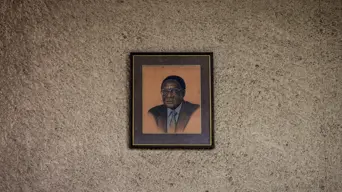Zimbabwe hearings over Mugabe-era massacre to start 26 June
Tens of thousands of people were killed over several years in the so-called Gukurahundi massacres under former leader Robert Mugabe, a few years after Zimbabwe's independence from Britain.

FILE: A portrait of former president of Zimbabwe, Robert Mugabe hangs on the wall at the Zimbabwe African National Union – Patriotic Front’s (ZANU-PF) conference hall in Harare, on 25 August 2023. Picture: JOHN WESSELS/AFP
BULAWAYO - Long-awaited hearings on notorious 1980s massacres by troops in Zimbabwe will commence on 26 June, a panel of chiefs set up by the country's President Emmerson Mnangagwa announced Sunday.
Tens of thousands of people were killed over several years in the so-called Gukurahundi massacres under former leader Robert Mugabe, a few years after Zimbabwe's independence from Britain.
Mnangagwa last year announced that survivors would be interviewed in a series of village hearings, in a bid to settle longstanding grievances and tensions.
"The hearings are starting on the 26th of June" and will be presided by traditional chiefs and a panel of community members, Chief Fortune Charumbira told a press conference in Bulawayo, in the Matabeleland region where the massacres were committed.
"Our approach is victim-centred," Charumbira said, adding the hearings would be closed to the media because of the sensitivity and "private nature" of some of the stories.
A report would be submitted to the president and financial compensation would be considered, he said, but added that the modalities and amounts could not be "predetermined before the hearings".
ESTIMATED 20,000 KILLED
Starting in 1983, Mugabe deployed an elite North Korean-trained army unit to crack down on a revolt in the western Matabeleland region, the heartland of the Ndebele minority.
They killed an estimated 20,000 people over several years, according to the Catholic Commission for Justice and Peace in Zimbabwe, a toll supported by Amnesty International.
The operation was named Gukurahundi, a term in the majority Shona language that loosely translates as "the early rain that washes away the chaff".
Critics say it targeted dissidents loyal to Mugabe's rival, fellow revolutionary leader Joshua Nkomo. Most of the victims belonged to the minority Ndebele tribe.
Mugabe, who died in 2019, never acknowledged responsibility for the massacres, dismissing evidence gathered by Amnesty International as a "heap of lies".
After taking power in 2017, Mnangagwa promised a resolution and set up a panel of chiefs to probe the massacres.
But activists said the process was flawed as there had been no official government apology and victims were not consulted.
Activist Mbuso Fuzwayo on Sunday dismissed the initiative as "a sham from the start".
“This is being dealt with from the position of the perpetrator and not the victims," he told AFP.
"Some of the known perpetrators are people in positions of power and they are the ones who led the initiative from the start," Fuzwayo said.
Mnangagwa, who has previously described the massacres as "a bad patch" in Zimbabwe's history, was security minister at the time but has always denied any responsibility.